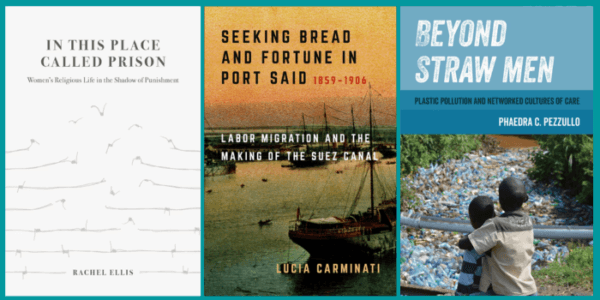About the Book
A free ebook version of this title is available through Luminos, University of California Press’s Open Access publishing program. Visit www.luminosoa.org to learn more.
Many of the hundreds of thousands of Syrians who immigrated to the US beginning in the 1870s worked as peddlers. Men were able to transgress Syrian norms related to marriage practices while they were traveling, while Syrian women accessed more economic autonomy though their participation in peddling networks. In Possible Histories, Charlotte Karem Albrecht explores this peddling economy of the late nineteenth and early twentieth centuries as a site for revealing how dominant ideas about sexuality are imbricated in Arab American racial histories. Karem Albrecht marshals a queer affective approach to community and family history to show how Syrian immigrant peddlers and their interdependent networks of labor and care appeared in interconnected discourses of modernity, sexuality, gender, class, and race. Possible Histories conceptualizes this profession, and its place in narratives of Arab American history, as a "queer ecology" of laboring practices, intimacies, and knowledge production. This book ultimately proposes a new understanding of the long arm of Arab American history that puts sexuality and gender at the heart of ways of navigating US racial systems.
Many of the hundreds of thousands of Syrians who immigrated to the US beginning in the 1870s worked as peddlers. Men were able to transgress Syrian norms related to marriage practices while they were traveling, while Syrian women accessed more economic autonomy though their participation in peddling networks. In Possible Histories, Charlotte Karem Albrecht explores this peddling economy of the late nineteenth and early twentieth centuries as a site for revealing how dominant ideas about sexuality are imbricated in Arab American racial histories. Karem Albrecht marshals a queer affective approach to community and family history to show how Syrian immigrant peddlers and their interdependent networks of labor and care appeared in interconnected discourses of modernity, sexuality, gender, class, and race. Possible Histories conceptualizes this profession, and its place in narratives of Arab American history, as a "queer ecology" of laboring practices, intimacies, and knowledge production. This book ultimately proposes a new understanding of the long arm of Arab American history that puts sexuality and gender at the heart of ways of navigating US racial systems.

